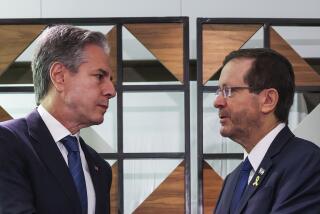8 Arab Allies Back Bush’s Initiative for Mideast Peace : Diplomacy: Baker terms it a ‘signal’ and says he’ll press Israel to show more flexibility. He also may meet with Palestinians reportedly approved by the PLO.
RIYADH, Saudi Arabia — Eight Arab countries gave a general endorsement to President Bush’s Middle East peace initiative on Sunday, and Secretary of State James A. Baker III said their move should prompt Israel to show more flexibility.
“Sounds to us like it’s a signal,” Baker said of the Arab statement. He said he now plans “to talk specifically and in detail with (Israel’s) leadership about what steps they might be willing to consider.”
Baker added that he is considering meeting in Jerusalem this week with a group of Palestinians who have reportedly been approved by the Palestine Liberation Organization--another move that could put pressure on the Israeli government. A senior U.S. official said the meeting would be with the Palestinians as individuals, “not a meeting with the PLO.”
The Arabs, all from countries that fought alongside the United States in the Persian Gulf War with Iraq, met with Baker for four hours and praised Bush for his proposal of a new round of negotiations on Middle East problems, including the Arab-Israeli conflict.
“We support this initiative,” said Saudi Arabia’s foreign minister, Prince Saud al Faisal, who presided over the meeting. “As my friend Mr. Baker said, with boldness of vision and determined diplomacy, even the most intractable issues can be resolved.”
But the Arabs also attempted to redefine Bush’s policy in their own mold, declaring that the aim should be to “end the Israeli occupation of the Arab territories and to ensure the national rights of the Palestinian people.”
“We have to address ourselves to the Palestinian problem, to putting an end to the Israeli occupation, and this is really the challenge that has been spelled out in the President’s speech,” Egyptian Foreign Minister Esmat Abdel Meguid said.
In his speech last week announcing the initiative, Bush called on Israel to trade “territory for peace,” but he did not ask for a
complete Israeli withdrawal from the occupied West Bank and Gaza Strip.
The eight Arab countries--Saudi Arabia, Syria, Egypt, Kuwait, Bahrain, Qatar, the United Arab Emirates and Oman--also stopped well short of any specific concession, such as a promise to recognize Israel.
Asked about that omission, Baker called it understandable because the negotiating process is so new.
“I don’t think it’s surprising that you do not have Arab governments coming out and unilaterally making statements about steps that they would be willing to take,” he said.
Baker and other officials have suggested that they will attempt to arrange reciprocal Arab and Israeli moves toward peaceful relations as their talks continue.
“We still have a long way to go,” the secretary of state warned. “It is very, very early. We are trying to get a process going.”
Part of that process on Sunday appeared to be a subtle attempt to put pressure on Israel in advance of Baker’s arrival there tonight. The visit will be Baker’s first ever to the Jewish state, and he made it clear that he wants the hawkish government of Prime Minister Yitzhak Shamir to meet the United States’ new Arab allies halfway.
Speaking with reporters aboard his airplane leaving Riyadh for Cairo, Baker noted pointedly that the Arabs are willing to negotiate, “assuming that it is a process embraced by others--including, most importantly, Israel.”
Baker has been promoting what he calls a “two-track” process--meaning two sets of negotiations, one between Israel and the Palestinians and the other between Israel and its Arab neighbors.
So far, however, the Arab countries have publicly approved only the first track, and Israel has approved only the second--leaving Baker the only one rolling down both tracks at once.
Further widening his diplomacy, Baker made a point of telephoning Soviet Foreign Minister Alexander A. Bessmertnykh from his plane en route to Cairo to tell him the results of the meeting. After landing in Cairo, Baker and several aides gave a fuller briefing to the Soviet ambassador to Egypt, Vladimir P. Polyakov. They said they briefed the Soviet envoy on the ground because Baker feared that his phone conversation with Bessmertnykh might not be safe from eavesdroppers.
Baker’s meeting with the Arab foreign ministers on Sunday was notable in its symbolism. At the head of a round, inlaid-wood table sat Prince Saud, whose kingdom has taken a newly assertive role in Arab diplomacy since the Gulf War, with Baker at his right hand.
Veteran diplomats here could recall no similar occasion at which the United States had been so openly embraced as an ally by so many Arab countries.
After a long lunch, Saud personally drove Baker to the airport in one of the royal family’s Mercedes-Benz sedans--with Egyptian Foreign Minister Meguid and Syrian Foreign Minister Farouk Shareh along for the ride.
“That’s the new axis,” a U.S. diplomat said. “The United States and Saudi Arabia, with Egypt and Syria in supporting roles.”
The Arab foreign ministers also agreed to pursue a ban on all “weapons of mass destruction”--nuclear, chemical and biological, along with ballistic missiles--from the Middle East. Israel is the only Mideast country thought to have nuclear weapons, but Israel and several Arab countries are known to possess ballistic missiles, and Iraq is known to have used chemical weapons during its war with Iran.
Baker told them that the Bush Administration endorses the idea of an Arab peacekeeping force, staffed largely by Egypt and Syria, to replace American and other allied troops now in Kuwait and Iraq.
Egyptian Defense Ministry officials said the force would consist of about 100,000 troops--including 60,000 to 65,000 Egyptians and 20,000 to 30,000 Syrians, with the remaining 5,000 to 20,000 from the Gulf states.
American and Saudi officials have said they will seek to place the force under U.N. auspices before it is deployed along the Kuwaiti border with Iraq.
The Egyptian forces will include infantry, armor, air force and air defense, the officials said.
The costs of maintaining the force are still being negotiated, but Egyptian officials said the total could come to about $15 billion a year, with $10 billion to $12 billion of that going to Egypt in the form of grants from the Gulf states.
The question of a meeting between Baker and Palestinian representatives is a delicate one because of reports that anyone whom Baker sees has been approved by the PLO. Most Palestinians recognize the PLO as the only group authorized to speak for them, but Israel--despite PLO leader Yasser Arafat’s renunciation of terrorist tactics in 1988--continues to consider the PLO a terrorist organization.
Neither the United States nor any Palestinians have issued specific invitations for talks during Baker’s Israel visit. Last week, Baker said he “would of course be pleased” to meet with Palestinians if they wanted to, but a senior U.S. official said Baker had not personally sought such a meeting because, among other reasons, “we don’t want to be seen as somehow anointing certain Palestinians.”
If Baker meets with Palestinians in Jerusalem, he will be renewing a dialogue that was broken off last June.
Then-Secretary of State George P. Shultz met with a handful of Palestinians from the West Bank and Gaza in 1987--drawn from a list that the State Department had carefully checked to eliminate known members of the PLO.
Then, in 1989, Shultz approved a formal meeting between U.S. diplomats and PLO officials for the first time. But that dialogue broke down last June after a series of terrorist attempts by PLO-affiliated groups.
The U.S.-PLO relationship was further damaged by Arafat’s support for Iraq in the Persian Gulf War. Last week, Bush said in an interview with Arab journalists: “We’ve been very disappointed in the PLO here. . . . Their role in the security, at least for now, in my view, has been diminished because they bet on the wrong horse for the wrong reasons.”
Baker aides said they were not troubled by the PLO’s reported endorsement of the Palestinians who might meet with the secretary of state. “We know who they are,” a senior official said. “These are people our consul in Jerusalem meets with all the time. These are people who Israeli officials meet when they want to talk to a Palestinian.”
Israel’s government has already signaled that it is not happy about the Arabs’ diplomatic line. “If the Arabs come and tell us that territory is the primary objective of negotiations, it is a sign they are not really aiming for peace,” said Yosef Ben-Aharon, an adviser to Shamir. “If they tell us they finally decided to recognize Israel’s existence and deal with us . . . then they can place on the negotiating table anything they wish.”
Times staff writer Kenneth Freed in Cairo contributed to this report.
More to Read
Get the L.A. Times Politics newsletter
Deeply reported insights into legislation, politics and policy from Sacramento, Washington and beyond. In your inbox three times per week.
You may occasionally receive promotional content from the Los Angeles Times.











